Pagan Rites (Tribes of Britain Book 0) Read online
PAGAN RITES
The prequel story
Sam Taw
This is a work of fiction. Names, characters, organisations, places, events, and incidents are either products of the author’s imagination or are used fictitiously.
Copyright © 2019 by Sam Nash writing as Sam Taw. All rights reserved.
No part of this book, or any portion thereof, may be reproduced, stored in a retrieval system or transmitted in any form or by any means, electronic, mechanical, photocopying, recording, or otherwise, without the express written permission of the publisher or author.
Cover art supplied by Carantoc Publishing Ltd
First released, 2019
ISBN 978-1-9160051-7-4
Carantoc Publishing Ltd.
www.carantocpublishing.com
Please note that this product was created by a British author. Except for Cornish slang and dialogue, spelling and grammar are corrected to British English. There are also scenes which may offend more sensitive readers. It is not deemed suitable for children
Join my readers’ group and receive the EXCLUSIVE story, Pagan Fury
Three unsuitable lovers.
Two valuable metals.
One critical mission.
https://www.carantocpublishing.com/sam-taw
The Dumnonii have no copper for their forges. Without a new supply, there will be no more bronze weapons for the inevitable battle ahead.
Tallack, must cross the western ocean to negotiate an alliance with the obstinate Dathi of the Ivernii and complete an impossible task to gain his trust.
Can he succeed where once his father failed?
Join the young warrior and his crew in a lust fuelled, intense quest on the shores of Iwerdon and find out for yourself.
This story takes place between book one, Pagan Death, and book two, Pagan Curse. Please be aware that there will be spoilers that might ruin the enjoyment if they are read out of order.
Author Note:
Evidence supporting lifestyle in this era emerges almost on a daily basis, thus is the changing nature of archaeological theories. While much of the story is grounded in fact, some aspects are products of the author’s imagination, for example, previous historical theory suggested that rabbits and hedgehogs were not present in Britain at this time, being a later import by the Romans. Other historians later claimed to have found evidence for their existence in the Late Bronze Age. While I have tried to find conclusive proof to support the story, there may be some inaccuracies as new digs unearth the truth.
Similarly, tribal names in the Bronze Age were never recorded in Britain. The earliest notation of them was found among Roman antiquities and there is every chance that they were altered to comply with their own language. I contemplated name usage a great deal before writing this series, and without any other indication of names, decided to use those recorded by the Romans much later, since they must have had a foundation in the local language from generations before. .
To Ade, cheers me old mucka.
CHAPTER ONE
The lookout bellowed from the watchtower at the side of the compound gates. I cleaned my hands of half-churned butter and walked from my hut to see what all the noise was about. Riders from across the compound required assistance. A dozen or so hunters rode into camp, dragging a stretcher fashioned from birch posts and animal hides. Laying across the back was one of their warriors. His guts protruded from a slash in his belly. I could smell him from quite a distance; rotting offal.
I knew why they had brought him, but didn’t have the courage to tell them that they were wasting their time. Sighing, I wandered into my roundhouse and fetched my knife wrap and medicine kit. I had just enough catgut prepared and soaking to do the job. Scooping up the whole jar, I walked across the boardwalks to the Long Hut, where the warriors had carried the poor fellow to rest.
“Mind out.” I hollered, pushing the young ones and nosy elders of the camp out of my way as I entered. “Let me at him, boys.” One of the warriors, Lorden, took hold of the jar as I thrust it at him. I laid my knives and kit bag down on a table and peered at the man. He cradled his stomach like a babe, guarding against approach. He groaned as I touched his arm.
“Do you want me to help or not?” Sometimes the bigger the man, the more they whine over injury. In this one’s case, there was little I could do to prevent the inevitable. He moved his arm away, allowing me to see the raw flesh and bloodied humours oozing out. The pink tubes poked through the hole in his middle. I turned to the great lump of a man holding the jar of cattle gut. “Fetch me some boiled water and the chief’s salt pot.” Lorden ran like a chased dog, plonking my jar down and hurrying through the door at the rear of the hut to the roasting pits.
Shooing most of the onlookers away, I found my leather strapping and put it between the man’s teeth. “Bite down on that. This is going to smart.” As he positioned the strip in his mouth, I grabbed my sharpest knife and slit the gash open wider, allowing me to push the distended bowels back inside. The scream was deafening, he almost cracked his teeth he bit down so hard. His brow was slick with sweat. It looked to me that the fever had already taken hold.
When Lorden returned with the items I requested, he was joined by our tribal Metern, Chief Aebba. “What’s all the fuss about. Who asks for my salt?” He waddled in to the centre of the hut and pushed his way past the straggling crowd.
“I did, Nephew. I have need of it to flush out this man’s innards. I’ll do what I can to replace your stock.”
He stood on the opposite side of the table, staring at the writhing man. “No need, Aunt. I can spare a bit of salt for my best hunters.” He turned to Lorden who carried the jugs of heated water to my side. “How did this happen?”
Lorden held one steaming jug aloft while I sprinkled in a scoop of salt and stirred it with the blade of my longest knife. I poured in some cooled water to offset the heat.
“The aurochs are back.” Lorden panted. “We tried to kill a couple for the drying racks, but this massive bull charged at us. Took Branok here right off his horse and gored him before going after me. We were lucky to escape.” Lorden gestured to the man on the table.
Taking the jug from him, I poured the salt water into Branok’s open belly. He cried out in agony, clenching his muscles and pulling his knees up to his chest. Aebba moved to stand at the foot of the table and held down Branok’s legs so that I could finish my work. Parts of his skin had blackened on their journey back to camp. It made the edges of the wound too brittle to sew. I had to cut away the dead bits and try to salvage what was left.
“Where did you see the aurochs? Was the herd very big?” Aebba asked, pressing his weight down on Branok as I clipped away the rotted flesh with shears.
Lorden winced, sympathising with his friend’s pain. “They were heading south from Sticklepath; grazing the valleys near Higher Tor.”
Aebba grinned, distracting me from my job. I mopped out the excess blood, humours and moisture before threading my sturdiest bone needle with catgut.
“What are you grinning at, have you got wind?” I said to Aebba, and then turned my focus back to stitching my unfortunate patient.
“The aurochs are back on our moors, Aunt. You know what that means, don’t you?”
I did know exactly what it meant. Aebba was planning to send his three boys out into the wilderness to hunt the most dangerous creatures in the land.
“It’s time for my sons to become warriors.” The grin stayed fixed to his tanned features. I thought about suggesting a less volatile animal to kill, but I knew it was pointless. It was the way of our tribe. Every warrior had to prove their courage and strength before selection into one of the tr
ibal clans. For the sons of the Dumnoni Chieftain, the quest had to be the most dangerous of all.
Lowering my voice to a growl, I leaned in towards my nephew and said, “The aurochs did this to a full-grown man. Is this what you want for your boys too?”
Aebba glared at me with narrowed eyes. “They will bring that bull back to me, by the grace of Cernonnus, and we will be there to watch over them.”
“We? You can’t be serious, why would you make me go with you?” I stopped stitching and shrieked at him.
“If they do get injured, I don’t want them two days ride away from help and you’re the best healer this side of the River Exe.”
There was no use in arguing with Aebba. I’d known him all his life. Once his mind was set, no amount of reasoning would shift him. I mixed a paste of plantain, salt and grease and smeared it over the stitches. A couple of layers of fresh leaves protected him from the worst of the mud and filth, but I feared that my efforts were too late to be of use.
Lorden and his warriors lifted a limb each and carried him off to his family with my promise to check on him later. Aebba was already issuing orders to his slaves at the roasting pits, and gathering our family together for his announcement. I left shortly after, returning home to determine what stocks I would need to replenish before our trip to the moors. There was so much to organise and I don’t have the strength or stamina that I had when I was young.
Word flew around the compound. Long before Aebba could make his great announcement, the boys and their mothers all knew what was in store. I went in search of my friend who weaves fine woollen fabric. If I was to spend a few nights out on the moors, I needed warm clothes.
As I approached her hut, I saw Aebba’s eldest son, Paega, loitering by the horse pen. He had a furtive look about him. I stood and watched him from across the field, anticipating his actions. He looked all around before bending low to pick something up from the mud. Slipping between the wooden cross struts, he mingled with the horses, stroking their backs and noses and soothing them with low mutterings.
I lost sight of Paega for a few moments, as the muscular flanks of the ponies hid his slender form as they jostled and fidgeted around him. Stepping closer, I tried to see where he’d gone, only to find him leaving the pen the same way he’d entered. Whatever that child does, you can bet your boots that it was at someone else’s expense.
With enough material to stitch a pair of thick undergarments, I tottered off in search of salted pork. Aebba was both generous and kind to his old aunt, providing a steady stream of tin ingots to trade. I wish I could say the same about his new wife, young Brea from the Ordoviches Tribe. Poor little mite was sent as an offering to cement a trade agreement with Aebba. In exchange for regular supplies of our tin, the Ordos brought boat loads of copper down the coast from the mountains. It was an uneasy alliance, but suited our needs more than theirs. Aebba found himself with yet another wife, to add to the two he already had. If there was but one thing, I could change about Aebba the Wild, it would be his treatment of Brea. She maybe a daughter of great Chieftains, but Aebba has little respect for the mountain dwellers, consequently, Brea has more in common with his slaves than his two other wives.
I stowed my bartered goods in my hut and trekked back to the Long Hut to find out when we were set to leave. Aebba glowed from too much ale. He sat on his high bench with his ceremonial bronze sword across his lap, buffing it to a golden shine. The twins sat by his side, watching every move he made. Wandering closer, the boys saw me.
“Aunt Mel, I hear you are to come with us to the moors.” Tallack said, jumping up from his seat to greet me. He’s the younger of the two, but only by a sunset. His brother, Blydh, stayed put. It’s hard to tell if he was pleased by the news or not. His expressions alternate between stern and taciturn.
I addressed their father. “I thought you were going to make a big announcement tonight over the feast?”
Aebba blustered. “Well, yes, I was but I got carried away and couldn’t wait. My boys will be the best warriors in the land.” He lifted the shining blade aloft and admired his reflection. “I have ordered the smith to forge three new swords, just for the occasion. How do you like that, Blydh?”
“I like that very much, Father. Will they be as large as yours?” Blydh stood and held out his hand to take the sword from Aebba. There was a moment of silence, as Aebba pondered over how to explain the decorative monstrosity.
I, however, had no such difficulties. “Wouldn’t do you much good if it was, boy. It’s all for show. The best blades are shorter with a deep-set ridge down the middle to stop it from buckling, and it must have the correct quantities of tin and copper in the mix or it’ll be much too soft for fighting.”
They looked at their father and then at me. From their crestfallen faces it was clear that I had shattered a few illusions.
Aebba was forced to agree with me. “That’s right, son. This great sword is a magnificent thing, as is the bronze shield hanging on the wall over there, but they are not fit for battle. They show the status of the Dumnoni Tribe, and will one day pay my fare to the Summerlands to sit beside Cernonnus with our ancestors.
Tallack didn’t seem at all bothered by the revelation that his father’s weapons were just for show. “But the ones you are having made for us will be strong and sharp, won’t they?”
“They’ll be the finest in the land, you mark my words.” He gave Blydh the blade and watched his son’s arm falter under the weight. “You’ll need to build up those muscles if you are to become a warrior. The pair of you look as though you’ve not been fed for a week.” He squeezed Blydh’s upper arm and chuckled. This is the best side of our Metern. He is warm and generous to a fault, until you cross him. It’s the other side of him that you have to avoid.
With Aebba’s permission to barter for whatever I needed to take with us to the moors, I left them to gather essential plants and bark from the wood beyond the compound. The smith was already sharpening the edges on one of the new swords as I passed, heading for the gates. Aebba would want to leave as soon as the blades were finished, for fear of the aurochs leaving the moors. For such large beasts, they can be difficult to track, particularly when they cross soaked peaty ground, their hoof prints get lost in the moss.
I picked up my pace, leading my pony to the forest upstream. On a sunny bank, next to a tributary to the River Exe, I found a good spread of soapwort near a few unstripped willow trees. It’s almost a shame to ruin these pretty little pink flowered plants, but we must be able to wash our linens and hands while we stay on the moors.
With a hand hoe, I dug and scraped out a few soap roots to dry for our trip and sliced plenty of willow bark. Aebba has a tendency to over indulge in ales and traded wines, when he gets going. At least he’ll have plenty of bark to chew on come morning, and it’ll save me from losing my temper with him. I harvested some green twigs, a little milkwort and a reasonable bunch of watercress, before plodding back into camp ready for the evening feast.
Rounding the final bend in the track, I finally found what I was looking for, a patch of the cure-all mallow. Taking a sickle to the lush growth, I cut the plant at the base of the stem, taking the newest shoots, leaves and flower buds. Leaving over half the plant to re-grow, I dug up some of the roots and tucked them into the pouches slung either side of my pony. I am convinced that it is too late for Branok, but the healing plant is certainly worth a try.
Trudging through the muddy entrance to the compound, I fed the pony and set him loose in the horse pen with Aebba’s best stallions and brood mares. He can have some company while we’re away, and the Chief’s slaves will make sure he is looked after. Taking my harvest into my hut, I banked up the fire and set to chopping the mallow leaves and steeping them in hot water. With a fresh plantain paste mixed and some willow bark for his pain, I walked the boards over the soggy ground to the huts at the riverside.
I wasn’t sure which house was hosting poor Branok. As luck would have it, Lorden was loiterin
g outside one of the roundhouses closest to the stream. I assumed he was awaiting his friend’s recovery.
“Is he in this one?” I nodded to the doorway just beyond where he sat, not stopping for his answer. “Ho, there. I’ve come to check on the patient.” Sticking my head through the door flaps, I saw his mother kneeling by his bunk, weeping.
When she saw me, she jumped to her feet and welcomed me inside. “Fur Benyn, it’s good of you to come. Thank you.” She gushed. It shouldn’t irk me to be called a wise woman, but it does. I know that it is their idea of bestowing respect on someone from a long line of Chieftains, who has no title of their own, but the burden of such lofty respect is a heavy one, especially in times like these. I knew that Branok would not live out the night, yet all who knew of his plight expected me to perform a feat worthy of the gods.
“I’ve brought him some mallow tea to clean the bad humours from his blood. I can’t say it will do the trick, but it can’t harm him to try.” She led me over to her fevered son, his linens and bedding were soaked through and he thrashed about in agony. I carried two small beakers. One of steeped willow bark, the other a strong brew of mallow. “Call that oaf Lorden in to help us.”
The young warrior entered and did as he was asked, lifting his friend by the shoulders until we could steady his head to pour in the tonics. From my medicine kit, slung over my shoulder, I produced the plantain paste and set about redressing his wound. The leaves came away from the stitches easily, the oozing had washed out the healing ointment. It smelled awful, but I was careful not to react. It was bad enough having Branok out of his wits with fever, I didn’t want his mother hysterical too.
“Will he recover, Fur Benyn?” It was Lorden’s pleading tone asking. I gave him a purse lipped frown, hoping he would take the hint and not ask again. When I failed to answer, his mother’s tears flowed once again. Using a little of the mallow tea, I trickled it over the wound site, dabbed it dry and reapplied the paste and leaves. The sun was low in the sky. That was usually when the elders and family of the Metern arrived at the Long Hut for the feast.

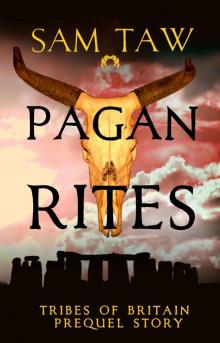 Pagan Rites (Tribes of Britain Book 0)
Pagan Rites (Tribes of Britain Book 0)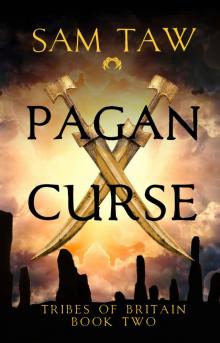 Pagan Curse (Tribes of Britain Book 2)
Pagan Curse (Tribes of Britain Book 2)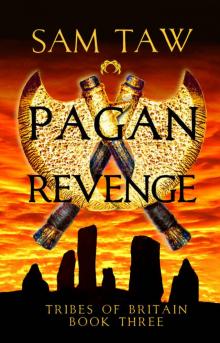 Pagan Revenge
Pagan Revenge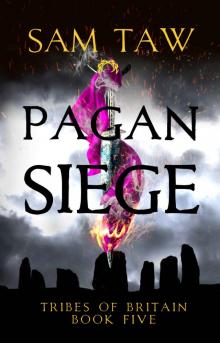 Pagan Siege (Tribes of Britain Book 5)
Pagan Siege (Tribes of Britain Book 5)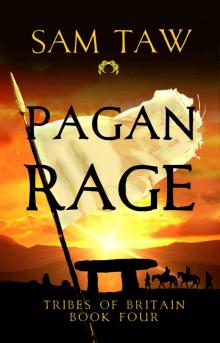 Pagan Rage
Pagan Rage